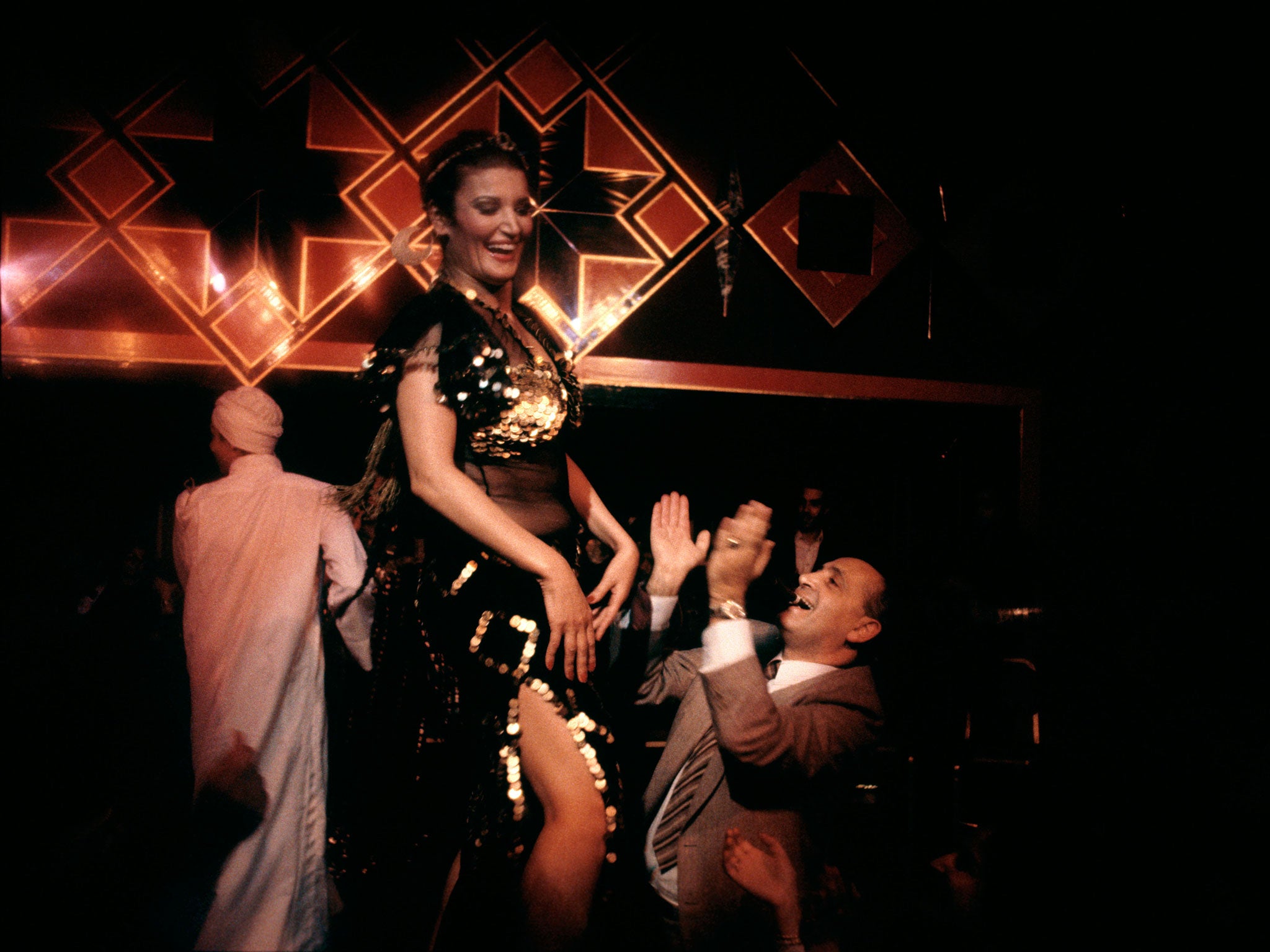How the ancient Egyptian art of belly dancing is suffering a wobble in popularity
The risqué entertainment survived the Muslim Brotherhood, only to be sidelined in late-night, run-down clubs

It’s one in the morning at the Scheherazade theatre in downtown Cairo. The smoke from water pipes is thick in the air and the band has started to play.
Outside, the crowds are cheering Abdel Fattah al-Sisi, the President-elect who was declared victor with 96.9 per cent of the vote, letting off occasional fireworks.
But inside, no one is thinking about politics. The first dancer sashays on to the stage in a sparkling zebra print costume and with thick-caked make-up. She is about 50 and moves awkwardly.
The crowd, mostly lone men of middle age and over, stare indifferently towards her, even as the tempo of the music rises: the tune is “Teslam al-Ayady” – or “Bless their Hands”, a pro-military song used to rally support for Sisi during his campaign.
For the mostly poor clientele, a couple of beers here can easily set them back a day’s wages – more than in the bars playing house and techno that young middle-class Egyptians frequent just a few blocks away.
“They come here to feel rich and powerful,” a young waiter said.
The dancer tries to smile as she shimmies. Above the sparkling silver of her platform heels, the soles of her feet are a painful red.
The venue isn’t doing much better. The murals depicting tales from the Thousand and One Nights are pitted and faded, and the tablecloths are synthetic blue blankets lifted from Egypt Air, the national airline.
This was once one of the most glamorous cabarets in Cairo, and the black-and-white pictures on the wall recall the time when Tahia Karioka, a film star who danced for King Farouk (and once slapped him after he threw an ice cube down her dress), reigned supreme.
“There’s prostitution, a lot of drugs, a lot of alcohol,” said Luna of Cairo, an American belly dancer. She also describes bitter competition for work, as dancers steal each other’s costumes or even call the morality police on each other. According to staff at Scheherazade, other police officers are regular customers.
Luna herself performs at other venues for tourists and wealthier Egyptians, but has interviewed dancers from all over Cairo as part of her postgraduate research into belly dancing culture.
She found that dancers and musicians struggle to reconcile their work with the values of their culture. “The average lower-class Egyptian dancer is ashamed of what she does and is looking to quit as soon as possible,” she said. But the money is better than in many alternative lines of work available to working-class women without qualifications.
Belly dancers are at once an object of fascination and contempt for many Egyptian men. “You are seen as a celebrity and the sinner at the same time,” said Luna.
What is called belly dancing in the West is raqs sharqi in Arabic, or oriental dance, and is the most popular form of dance at parties and weddings in the Arab world, although most women would never wear the kind of costumes on show at Scheherazade except in private.
Under the year-long rule of the Muslim Brotherhood’s Mohammed Morsi which ended last July, many dancers and venues feared that the Islamists would crack down on their trade. A belly dancing television channel was closed down by the courts in February last year.
“Artists are sitting at home because Islamists destroyed art and creativity,” Nagwa Fouad, once the favourite dancer of Henry Kissinger during his diplomatic visits to Cairo, told a newspaper.
Going on the counter-attack, the prominent belly dancer and provocateur Sama al-Masry released a series of salacious videos in which she denounced the Muslim Brotherhood. But there was no real crackdown, and since Sisi ousted the Brotherhood, there has been no discernible increase in customers flocking to performances.
Even al-Masry found that with the Brotherhood gone, her trade got no easier. She was summoned before a court in April on charges of “spreading obscenity”, and her own television channel – which she used to campaign against Islamists – was ordered to close. A new feature film, Halawet Rooh (“Sweet Soul”), featuring a belly-dancing Lebanese diva, has been banned – although a YouTube clip of one dance scene has been viewed more than 13 million times.
Belly dancing has been buffeted by the rise of conservative Islam in recent decades, which has brought more forbidding social attitudes with it. But the state’s readiness to regulate what even many non-Islamists see as licentious and disreputable predates that.
Costumes which show the midriff have been illegal since the fifties, in the days of former leader Gamal Abdel Nasser, but are worn universally.
At Scheherazade, the song changes and the zebra-striped dancer descends from the stage. A man with a slicked-back mullet stands and drops a shower of Egyptian five-pound notes – worth about 50p each – over her head. Then he begins an ungainly dance with her, before his friend is pulled up to join in. A man with a combover scurries to pick up the notes.
Subscribe to Independent Premium to bookmark this article
Want to bookmark your favourite articles and stories to read or reference later? Start your Independent Premium subscription today.

Join our commenting forum
Join thought-provoking conversations, follow other Independent readers and see their replies